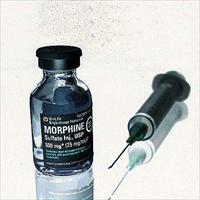KENYA: Morphine's role in palliative care

Charles Ndirangu had his left arm amputated after a road accident in 2002 but has since endured sharp pains down his left side, leaving him numb.
"The amputation was not done professionally, forcing me to undergo more surgery later," Ndirangu said. "I had the latest corrective operation in September 2007."
Now on morphine treatment, Ndirangu, a Christian preacher in Kiserian town, south of Nairobi, said he has been able to eat and sleep more easily as his wounds heal. "I was using expensive drugs to help in healing the wound but the pain was unbearable," he said.
Like Ndirangu, many Kenyan patients in severe pain use palliatives such as morphine, even though the drug is restricted.
"We start the patients on morphine depending on the degree of pain they are experiencing," said John Weru, a senior medical officer at the Nairobi Hospice. "Often, before the patients are referred to us for symptom control and supportive care, they are on weaker drugs."
Morphine, a narcotic proscribed in many countries, falls under a broad class of drugs whose importation is restricted.
At the Pharmacy and Poisons Board, strict regulations require companies that are registered to import it to submit quarterly, mid-year and annual returns to ensure accountability, according to Wilfred Ochieng, deputy registrar with the board.
Risk of addiction
Despite its use in the control of severe pain, morphine is highly addictive, and according to Weru, the risk of abuse is high if control measures are not followed. To minimise the risk, the Nairobi Hospice administers a diluted solution of morphine to patients.
"Most pharmacists are not willing to handle morphine and other controlled substances," according to Ochieng, for fear of falling foul of the law. The result is that some patients who might genuinely need the drug have problems accessing it.
Taxation on imported morphine is also high, making the cost prohibitive for most patients.
"We are lobbying to have morphine tax-exempt," said Weru. "The fear of abuse of morphine in palliative care is due to the lack of knowledge on prescription and use. If it is used as recommended it does not lead to addiction. To us, this is a lifeline drug and no person should die in pain."
Access restricted
Many cancer and HIV/AIDS patients suffer pain, said Zipporah M Ali, national coordinator of the Kenya Hospices and Palliative Care Association (KEHPCA), but the majority have no access to opioids in Kenya, as in most African countries.
"The government has not undertaken a review of the drug regulatory laws and policies to determine whether they are overly restrictive and an impediment to accessing opioids," she said.
The price of imported morphine powder was also a prohibitive factor, with one kilogramme costing about Ksh 300,000 (US$4,839).
"Sometimes the patients rely on donor support to access the drug; when the support ends we are forced to use weaker but more affordable drugs," Rufus Mwandiki, a nurse at Chogoria Hospital in Meru South District, said.
"The goal of palliative care is achievement of the best quality of life for patients ... the focus ... is the alleviation of symptoms, the maintenance of comfort and function," according to the World Health Organization.
But although the first hospice in Kenya was established 18 years ago, the concept of palliative care had not been embraced in the healthcare system, Ali said.
KEHPCA, she added, was advocating for palliative care to be included in the healthcare system as a basic human right. "Effective pain management is central to scaling-up palliative care in Kenya, resulting in improved quality of life for patients with severe pain," she said. "Recommended drugs for pain such as morphine and other opioids must be available and accessible to all patients enduring pain."
 Back and Next - Back and Next
Back and Next - Back and Next See Also - See Also
See Also - See Also